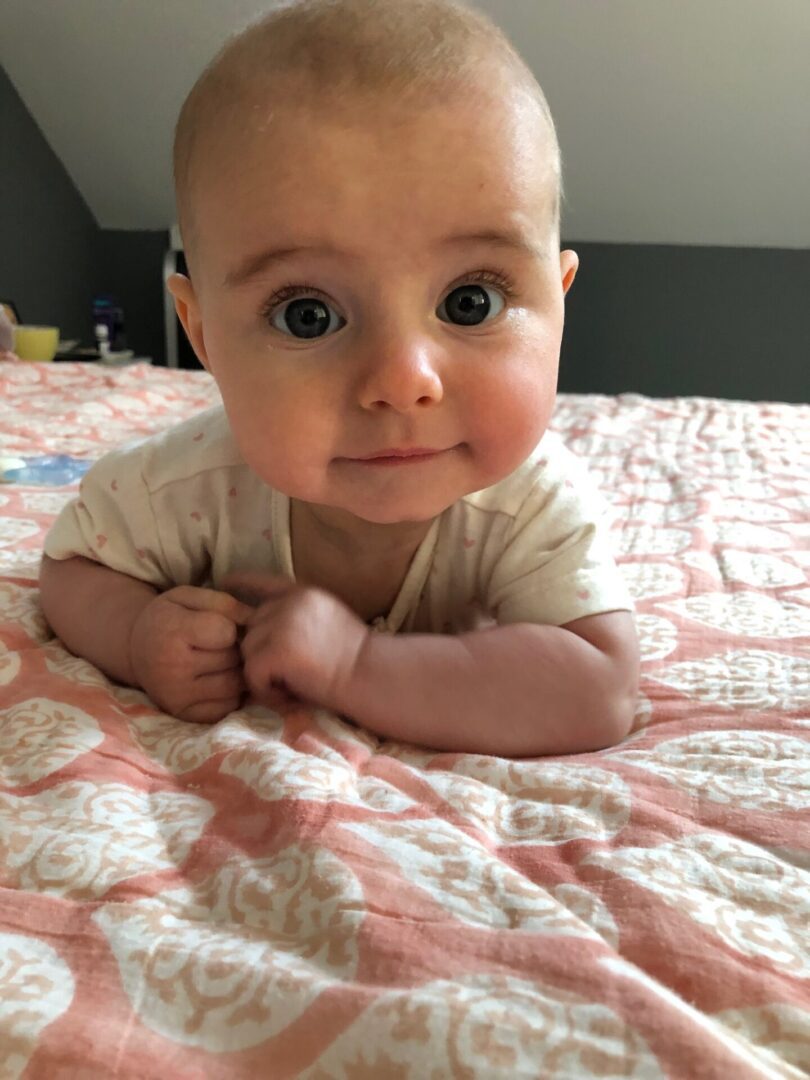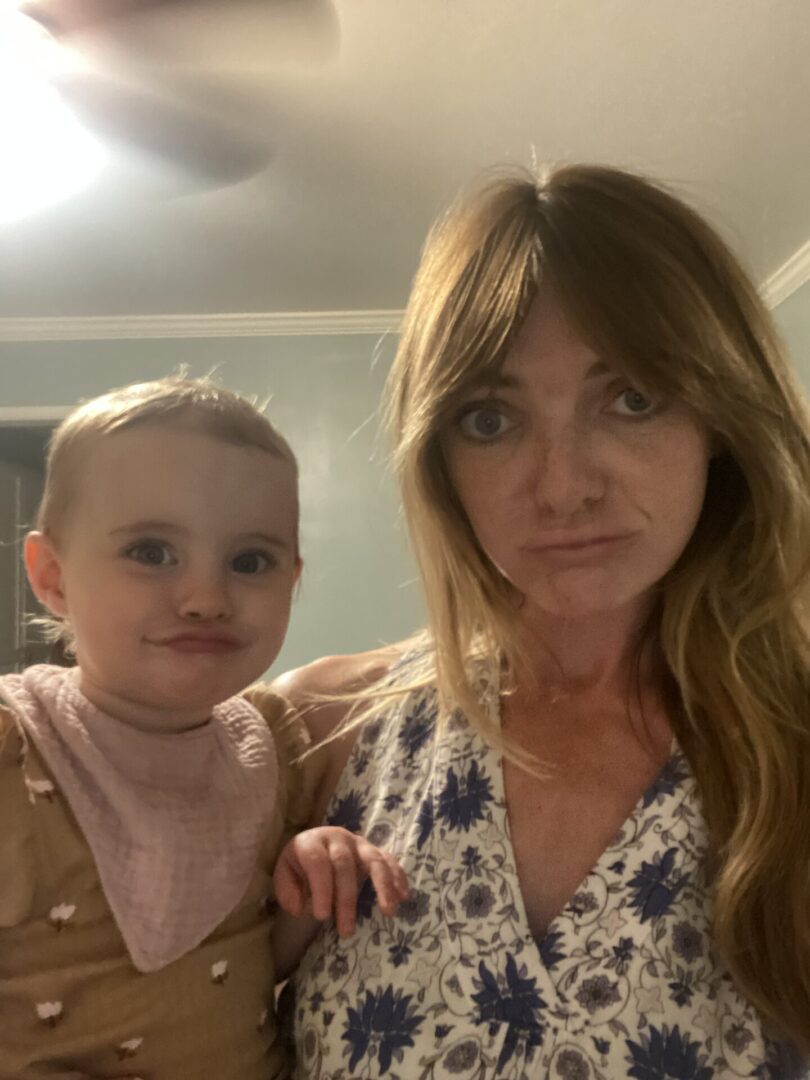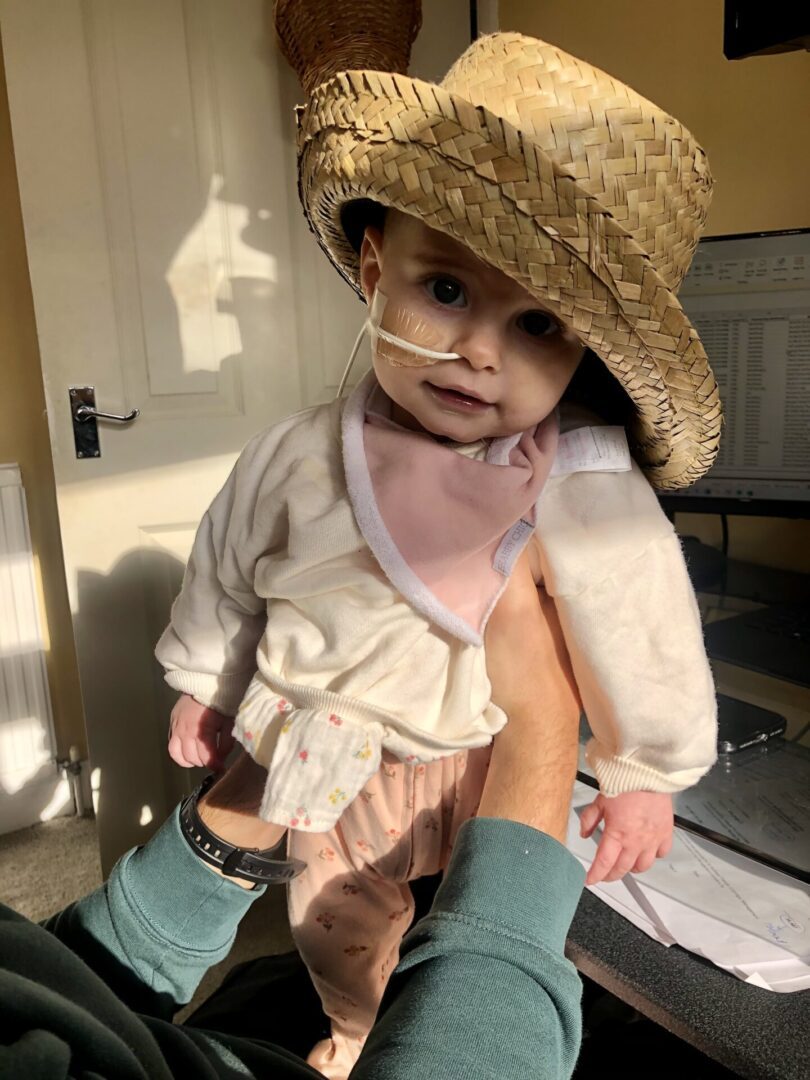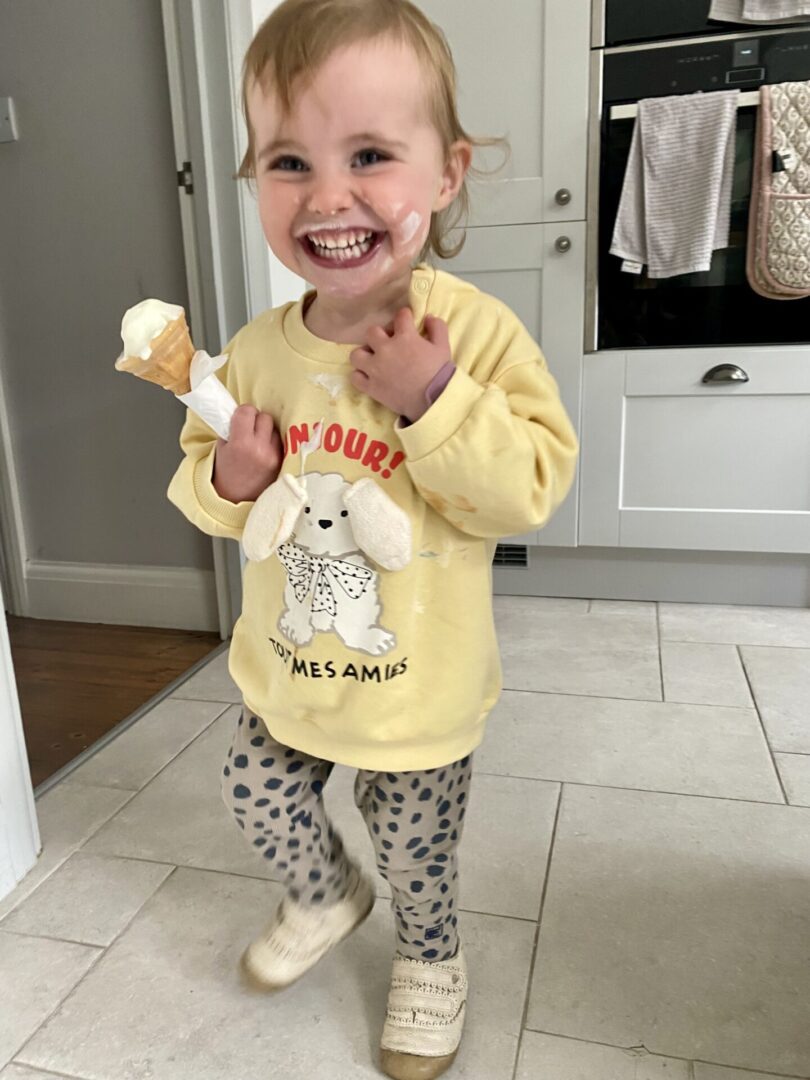Olive From The United Kingdom

Matt and I welcomed our first child, Olive, into the world on 28th March 2023 after a long labour and uneventful pregnancy. She was, and remains, the most perfect and beautiful little girl we have ever seen. Everything seemed relatively straightforward in the first few months, and we were fully immersed in the newborn haze and overwhelming love for our daughter. It is with hindsight now there are some things in those early stages which may have been the first signs that something wasn’t quite right.
Shortly after birth, Olive started vomiting very bright yellow liquid, but doctors didn’t seem concerned, and it soon settled. Despite seeming to breastfeed fairly well, she also wasn’t putting on weight as quickly as you’d expect. From about 8 weeks her poo totally changed colour and consistency, becoming various shades of green and runny. I took her to see the GP on numerous occasions with concerns about various things but was always told that she was a healthy baby.
As a first-time parent, you always want to believe this is the case. I even found myself at a friend’s wedding thrusting photos of Olive’s poo in front of someone I discovered was a pediatrician to see if he had any opinions on what could be causing it! Developmentally, there didn’t seem to be anything out of the ordinary; Olive rolled and smiled in line with what is considered “normal”, so we continued enjoying our life as a new family.
It was around 6 months that Olive started to vomit daily. The volume was alarming, and it varied from being milky to totally clear liquid. Back to the GP we went, but without witnessing one of the vomiting episodes, my concerns were again dismissed as being normal - all babies are sick after all. We knew her vomiting was far from normal and ended up seeking help from a private gastroenterologist, who suggested it could be an allergy or reflux. When an elimination diet and medication didn’t put an end to it, we felt lost as to what it could be and what to do next.
We also started to have concerns around Olive’s development. It became apparent that Olive was somehow different from babies in her peer group, and she wasn’t meeting expected milestones. Consequently, I started to withdraw from social situations where I would see other babies, I found the constant comparing and talking about what my baby was doing demoralising.
Olive also didn’t strike me as a particularly happy baby. I can recall very few times within her first year when she laughed, and I didn’t feel she was especially attached to me, despite us spending all our time together and obsessively breastfeeding her as my concerns around her weight gain continued. She was increasingly unsettled, and during a trip to Australia over Christmas at 9 months old, I became more concerned about her size. Every time I held her, I was alarmed at how light she was. She was also becoming increasingly lethargic - we needn’t have dreaded the day-long flight over to Australia, she slept for most of it.
On our return to England in January 2024, the realisation that something was gravely wrong with Olive was starting to dawn.
Our attempts at weaning her were unsuccessful, and I felt the pressure on breastfeeding her overwhelming at times as she continued to refuse a bottle. At a pediatric appointment at our local hospital, we flagged concerns regarding her meeting milestones, lethargy, and aversion to solid foods. By this stage, I was also fearful about having her weighed and wasn’t able to be in the room whilst it was done.
My fears were recognised when this latest result was plotted on the centile chart, and she had fallen off the chart entirely. She was recommended for a blood test (and this would be her first), but I was alarmed that he didn’t seem otherwise concerned about her. Again, whilst trying to take this as a positive, there was a sinking feeling that something was very wrong.

I will confess I was always Googling Olive’s symptoms. I often felt in the absence of medical help, Google would give me the answers. It was between this last appointment and her blood test that I came across the symptoms of B12 deficiency and Olive presented with all of them.
When we went for her blood test, I begged her phlebotomist to test her for it, but it hadn’t been specified by the paediatrician. I ended up in tears with the receptionists asking for it to be tested, but I was met with the words “if her doctor felt it was necessary, it would be tested”. Hours later, I got a call from her doctor saying we had to come into the hospital immediately as her blood test results had come back and there was reason to believe she could have leukaemia because of her white blood cell and platelet counts.
I sat, frozen in a café with Olive in my arms; she looked the palest and fragile she had ever looked, and I felt as if she’d just been handed a death sentence. We travelled to the hospital in total disbelief, and I had to recount her entire medical history before repeat blood tests were done. After an agonising wait, the initial results, which had caused the most concern, had normalized, but they identified that she had macrocytic anaemia and elevated ALT.
We stayed in overnight, feeling slightly reassured, until the next morning when another blood test was performed to ensure that the normalised result wasn’t the anomaly, and, thankfully, it wasn’t. It was whilst here that I asked if B12 had been tested, and they said it was within normal range but on the lowest end. Her strange results (persistent macrocytic anaemia and a fluctuating thrombocytopenia) prompted them to be sent off to another hospital, which specialised in paediatric haematology.
In the meantime, she was fitted with a feeding tube and put under the care of a dietitian to monitor her weight, and we were trained in giving her top-up feeds of formula to supplement the breastfeeding. We found the feeding tube quite daunting initially, but it was a huge relief to be able to give her extra calories and nutrients.

We met with the haematologist and, although she didn’t really have any answers, she did say that she had macrocytic anaemia and recommended a course of fortnightly B12 shots to get her levels up. The possibility of it being a metabolic condition was mentioned around this time, but it was just considered one of many possibilities. Olive was given her first dose of B12, and we would come back after a fortnight for the next.
There was an immediate improvement in her energy levels, her vomiting stopped, and she was even making efforts to crawl. We weren’t sure whether it was down to the B12 or the extra food she was getting, but it was truly amazing to see such an instant improvement, and at a repeat blood test, there was haematological improvement as well. Olive was also referred for an abdominal ultrasound to check her liver to see if a cause for the raised ALT level could be identified, but she was given the all-clear.
Given ongoing issues with feeding, we decided to also seek the help of a private speech and language therapist, and one thing I was interested to find out was whether she might have an undiagnosed tongue tie, which could be causing all her feeding issues. And apparently, she did!
his felt like a strange sort of relief – perhaps all her problems were down to this. Oddly, the specialist called me out of the blue one evening to say that she thought Olive’s eyesight was a bit “off” and asked if we had it checked out. I noticed her lack of ability to focus, and it was also around this time that she started to lose the ability to sit independently or bear weight on her legs.
Following the tongue tie diagnosis, we were eager to get it cut and I couldn’t wait to see how things would change after this appointment.
Sadly, it was the night of her tongue tie cut that Olive had her first eye-roll episode and all the hopes for a fresh start were quickly dashed. Initially, we thought it might be related to the stress of the day but over the next few days she continued to have repeated episodes. Each lasted a few minutes, and she seemed fully conscious throughout, but it felt totally abnormal.
When I spoke to her paediatrician about the eye rolling and regression in skills, he put it down to her anaemia. To my shock, she said that parents too often brought their children into hospital with eye rolling and it was just tiredness. Again, I tried to take this conversation as a positive, but I felt far from reassured.
Olive continued with eye rolling episodes, and after a week we took her to A&E. We were on the brink of being discharged home, having been reviewed, when we assume something in her medical history stood out to one of the doctors and we were kept in overnight with an MRI was scheduled the next day. They wanted to attempt this without sedation, and so we were locked in a tiny, dark room whilst we tried to get her to sleep. Inevitably, the whirring of the machine woke her up, and the MRI was unsuccessful, so we were sent home with an EEG booked for the next day. It was during this that I recall another heart-stopping moment as a consultant was called in to review the screen as she was monitored, a far from promising sign that things were ok.
We were sent home and told someone would be in touch, but before we even got that phone call, we were back at the hospital as an eye-rolling episode was then accompanied by Olive collapsing her head to the side repeatedly, which was truly terrifying. We were told that the EEG had demonstrated hypsarrhythmia, and Olive was epileptic.
We would be transferred to a hospital with a specialist paediatric neurology department so they could explore this further; the following days would be some of our darkest. Recounting Olive’s complicated medical history and reeling off her myriad symptoms to the neurologist was further proof that there must be something underlying that was causing so many problems. They repeated the EEG, which showed the same result.
They were confident she was experiencing Infantile Spasms. She was booked in for an MRI under sedation, and kissing goodbye to Olive in her tiny, fragile state as she was put to sleep was utterly heart-wrenching. After an agonising day of waiting for the results, they thankfully came back normal, apart from delayed myelination, which they said could be rectified in time.
Olive was started on an aggressive course of steroids and anti-seizure medication to try and stop the epilepsy before it could cause any longer-term damage. The seizures did stop, but the drugs totally changed her and took away any traces of her personality. They did, however, make her ravenously hungry, and we relished seeing her eat food enthusiastically for the first time! Before being discharged, we were given the option to take part in a study called Gene-STEPS, a global research study through Great Ormond Street Hospital that used rapid genome sequencing to provide early detection of the cause of epilepsy in babies under one. Blood would be taken from Matt, Olive, and me to look for changes in the child's DNA that might explain their condition. Without hesitation, we said yes and told the results could be back as quickly as a few weeks.
We returned home and adjusted to the new medication routine, a dramatically changed almost-one-year-old, and uncertainties around our future. After two weeks, her neurologist called with the results, saying they had found a defect with her MTR gene leading to a diagnosis of Cobalamin Disorder G, and we would be contacted by Great Ormond Street Hospital to come in to start her B12 treatment immediately. My overriding emotion on receiving this news was relief – there was a diagnosis, a treatment plan, and finally some answers. The call from the hospital came the next day, and off we went. A team from the metabolic department sat with us for over an hour, explaining her diagnosis of cblG, its rarity, and that Olive presented as a ‘textbook case’ for the disorder. They were reassuring, knowledgeable, and said that they hoped she was on the milder side given her presentation. She received her first injections (10mg/2ml of hydroxocobalamin), and we were trained in administering them ourselves.
Alongside folinic acid tablets, this would be the medication she would receive daily. Olive was discharged on her first birthday and after two days of treatment, we already started to see changes in her. She engaged in books and was happier and much more energetic. A brighter future finally felt within grasp.
Over the next few months, Olive weaned off her anti-seizure medication, and betaine was introduced. The strides in her development were startling. Whilst we have the medication to thank for this, we also attribute so much to Olive’s resilience and determination. She took her first steps at 20 months and words followed shortly after.
Olive recently celebrated her second birthday, and it allowed us to reflect on how far she (and we) had come in a year, and the challenges we’d faced as a new family. It’s impossible to articulate how proud we are of her and all that she has achieved, despite the setbacks.
Her doctors continue to be astounded by her progress and, though we have no doubt there will be bumps in the road, we are hopeful that she will live and full and happy life and not be defined by her condition.Her homocysteine levels are consistently around the 20 mark and all other levels are normal and, apart from some mild speech delay, we are no longer concerned about her development.
To any parent facing a new diagnosis or who has experienced a similar journey to us, keep going - you know your child better than anyone else, and there is a lot to be said for pure parental instincts. Today, Olive is an energetic toddler who prefers to run rather than walk, picks up new words every day, can sing along to her favourite songs, and loves nothing more than a cuddle!

We are so glad we found HCU Network America and connected with families who can guide, advise, and above all, reassure. I hope Olive’s story might do that for another family someday.
